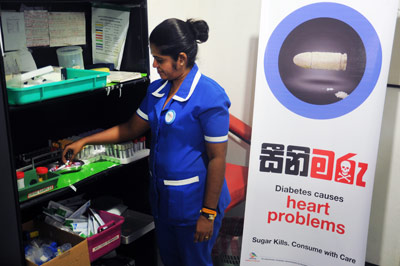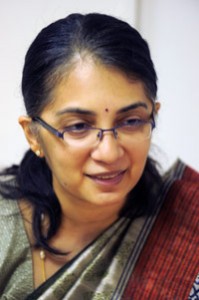Too many festivals, too little exercise
For 10 years the Healthy Life Clinic, headed by Consultant Physician and Diabetologist Dr. Kayathri Periasamy, has been trying to change the attitudes of Sri Lankans toward diabetes.

Healthy Life Clinic: Battling diabetes for the past 10 years. Pix by Amila Gamage
“There was very little focussed diabetes care in Sri Lanka when we started out,” notes Dr. Periasamy. “It is a disease, yes, but with awareness people can change their lifestyle, and we can reduce the prevalence of the disease in this country.”
Diabetes, quite simply, is a disease in which your blood glucose, or blood sugar levels are too high. More formally, it describes a group of metabolic diseases in which a person has high blood glucose (blood sugar), either because insulin production is inadequate, or because the body’s cells do not respond properly to insulin, or both.
In Sri Lanka the prevalence of diabetes is about 11% in rural areas, 13% in urban areas and 11% overall. The overall rate is projected to increase to 13.9% by 2030.
For perspective, the International Diabetes Federation notes that 8.3%, or 387 million people around the world live with diabetes.
4.9 million diabetes-related deaths were recorded in 2014. Sri Lanka’s statistics are so high because awareness has come too late, and the attitude is still too casual, notes Dr. Periasamy.
More disturbingly, one in two people with diabetes don’t know they have it (IDF-world). “It’s a silent, insidious disease,” she says. “In Asia, especially, people think ‘if I don’t feel any pain I don’t have to get myself checked’.
Even those at risk tend to be too relaxed about this.” In Sri Lanka, generally 30% of the population may not know they have diabetes.
The four main risk factors are family history, sedentary lifestyle, unhealthy diet and being overweight. There’s not much you can do about family history, of course, except to be extra vigilant and careful with your lifestyle, but the other three factors are fully in your hands.
21st century lifestyles place an extra strain on healthy living but it can be done, Dr. Periasamy will tell you.
Sri Lanka’s rising middle class may very well be the country’s problem-traditionally we associate higher income with unhealthier food and less physical activity when it should be the other way around, says Dr. Periasamy.
“In Asia we have too many vehicles, and too many festivals,” she says wryly. “Whereas in Western countries it’s now the other way around.

Dr. Kayathri Periasamy
More people walk, and consume less sugar.” You might work in an office, in which case it’s all the more important to ensure that you receive at least 30 minutes of exercise a day.
For those thinking that they don’t eat a lot of cakes and desserts, Dr. Periasamy has a word of warning-you’re probably exceeding your sugar limit for the day with tea laden with sugar.
Even with one teaspoon we consume sugar we don’t need, she notes. Refined sugar, the kind we lace our beverages and desserts with, “is absolutely not necessary” because all the sugar you need come in natural forms.
Being young doesn’t exempt you either. In 2012 a team led by Consultant Endocrinologist and Diabetologist Dr. Prasad Katulanda (also a senior lecturer at Colombo University’s Medical Faculty) screened young people over the age of 18 for blood sugar.
Some were identified as diabetic, and some, who were given sugar, recorded a spike in their blood sugar levels (thus indicating a tendency to develop blood sugar later in life).
The study concluded that 1 in 5 young people in Sri Lanka (20%) have diabetes or have a tendency to develop it. “You set the legacy for the rest of your life by how you eat and exercise during your 20s in particular,” Dr. Periasamy notes. “But even if you’re in your 30s or 40s or even later, you can still change your lifestyle. It’s possible.”
At the Healthy Life Clinic, Dr. Periasamy and her team aim to inculcate healthy living habits by raising awareness about the disease and the impact of lifestyle on it, while offering qualified diabetes care for patients.
The clinic offers a range of healthcare services but its primary focus is one-stop diabetes care. They offer consultation and follow-up services, diabetes care and treatment, diabetes counselling, diabetes check-up packages, diabetes care products and nutritional advice.
This is done through a variety of packages for family, corporates and individuals.
Their biggest battle is with the Asian fondness for medical myths, says Dr. Periasamy. “We’ve had so many cases of people who stopped taking their tablets because there’s a myth that those tablets cause kidney problems,” she says.
“What you have to realise is that it’s the disease that causes the problem in your kidneys, not the tablet.”
In fact, ensuring that patients follow their medication timetable and diet guidelines is a challenging aspect of diabetes care, we are told.
To ensure that their patients remain on top of all this, the clinic offers an annual package that covers everything, from check-ups to exercise to diet.
Even if you don’t have diabetes, but have a family history of the disease, it is recommended that you perform a check-up every 3-5 years.
But “if you have diabetes please, you have to see your doctor every three months,” Dr. Periasamy appeals. “It’s absolutely vital that you continue to receive medical perspective on your healthcare.”


